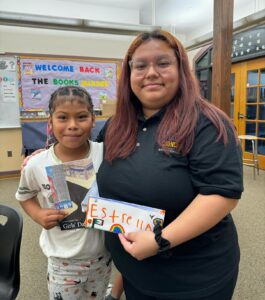Celebrating International Literacy Day: A look back on Camp Covington and our 2024 Global Guide, Diana Matias Pano.
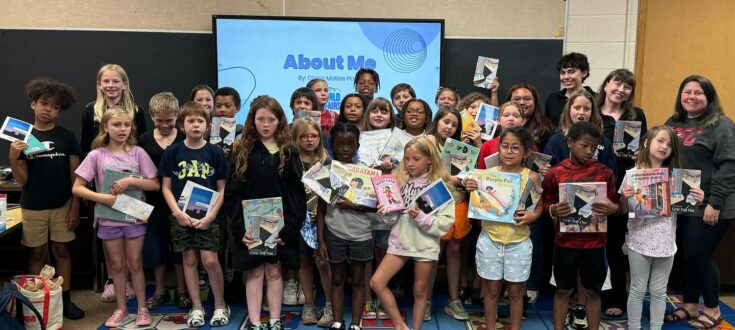
September 8th was International Literacy Day
This year’s theme was “Promoting multilingual education: Literacy for mutual understanding and peace”.
Why? Literacy has the ability to promote mutual understanding and respect, while solidifying communal identities and collective histories.
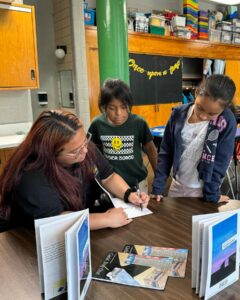 The World Affairs Council reflects on our 2024 Global Summer Camp with our Global Guide, Diana Matias Pano. In her role, Diana gave a presentation on her family’s Guatemalan and Mexican background, her educational career, and her goals for the future to many young students. Following the presentation, students were encouraged to write their own stories, received a signed copy of a book Diana wrote, and chose a book of their own.
The World Affairs Council reflects on our 2024 Global Summer Camp with our Global Guide, Diana Matias Pano. In her role, Diana gave a presentation on her family’s Guatemalan and Mexican background, her educational career, and her goals for the future to many young students. Following the presentation, students were encouraged to write their own stories, received a signed copy of a book Diana wrote, and chose a book of their own.
After presenting, we were able to see what the students would come up with their own short story. I was able to help some kids to start off with some ideas, and even got to listen to one of their stories, which was very interesting.
Storytelling as a medium empowers individuals to share their voices on a local and global level. Diana’s cultural background may have been different from some students, but familiar to others. And her book was about something that could happen to anyone regardless of background, getting lost in the city with your friends. A true story that is a rite of passage for many young people; where you are on your own for the first time and need to find your way.
“I enjoy showing the students about my culture and being able to share my story to them as well, along with having a copy and sign of my book even though my story isn’t special, but at least the student would know that anything can turn into a story. “
There is a power in relatability, a profound importance in sharing who you are to others. Experiences you may think are normal can be novel to others. However for those who share similar experiences, finding out that it’s shared connects them to a greater community, perhaps making them feel less alone. 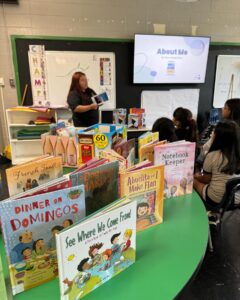
This is why Diana’s story was, is so important:
Although she was born in the United States, Diana is bilingual, speaking both English and Spanish. Many children Diana met were also bilingual or ESL (English as a Second Language) students, with varying degrees of English skills. Diana had a chance to speak to them in both Spanish and English. In doing so Diana naturally promoted multilingualism within the classroom, engaging students who might not have been able to participate in the activities had she only spoken English.
“Besides sharing my culture, dream, and future plans, I have gotten more nervous in translating since I was afraid that I would mispronounce and forget some words in Spanish.”
Diana’s leadership skills were exemplified in her confidence in public speaking, her ability to answer questions students had , and taking the initiative to translate for those who needed it.
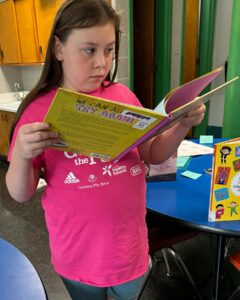 The students who were also bilingual shared the same nervousness Diana did about translation– despite the fact that they were already translating for others. However, they felt more confident and excited to go between both languages when they heard Diana doing the same. Meanwhile, students who were still new to the English language were immediately more engaged as they were able to fully communicate with and understand an adult who spoke their first language.
The students who were also bilingual shared the same nervousness Diana did about translation– despite the fact that they were already translating for others. However, they felt more confident and excited to go between both languages when they heard Diana doing the same. Meanwhile, students who were still new to the English language were immediately more engaged as they were able to fully communicate with and understand an adult who spoke their first language.
“ After giving the student a signed copy of my book and another book, it made me happy seeing them being excited.”
The books students got to choose from had stories about many different cultural backgrounds. Students were in awe of the illustrations, excited about the books they chose. It’s opportunities like these that encourage children to think about the world around them. To be curious about different countries and cultures while appreciating the similarities shared around the world. 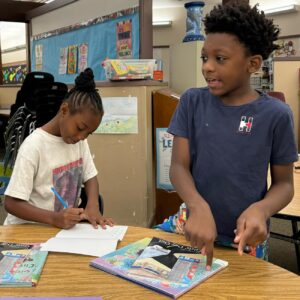
A multicultural, multilingual approach to literacy creates a better future, and is becoming more common. Aside from its cognitive and socio-economic benefits, children who grow up in this framework can become adults who can create lasting peace and policy solutions, inclusive to anyone regardless of their cultural background.
Literacy is a fundamental human right for all. It opens the door to the enjoyment of other human rights, greater freedoms, and global citizenship.
